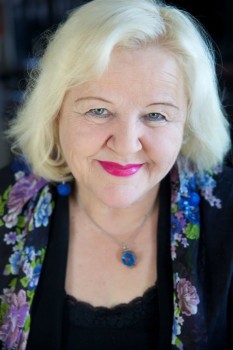Search results for "aulikki oksanen"
Des res
Extracts from the novel Juoksuhaudantie (‘The Trench Road’, WSOY, 2002)
Matti Virtanen
I belonged to that small group of men who were the first in this country to dedicate themselves to the home front and to women’s emancipation. I feel I can say this without boasting and without causing any bickering between the sexes.
A home veteran looks after all the housework and understands women. Throughout our marriage I have done everything that our fathers did not. I did the laundry, cooked the food, cleaned the flat, I gave her time to herself and protected the family from society. For hours on end I listened to her work problems, her emotional ups and downs and her hopes for more varied displays of affection. I implemented comprehensive strategies to free her from the cooker. I was always ready with provisions when she got home exhausted after a day at work. More…
Solzhenitsyn and Silberfeldt: Sofi Oksanen publishes a best-seller
25 April 2012 | In the news
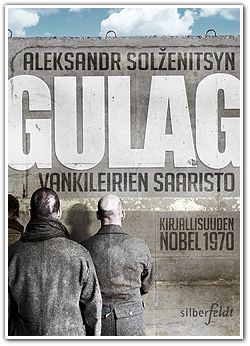
Nobel Prize 1970: Aleksandr Solzhenitsyn
After falling out with her original publisher, WSOY, in 2010, author Sofi Oksanen – whose third novel, Puhdistus (Purge, 2008), has become an international best-seller – has founded a new publishing company, Silberfeldt, in 2011, with the aim of publishing paperback editions of her own books. Its first release was a paperback version of Oksanen’s second novel, Baby Jane.
Oksanen’s new novel, Kun kyyhkyset katosivat (‘When the pigeons disappeared’), again set in Estonia, will appear this autumn, published by Like (a company owned by Finnish publishing giant Otava).
However, in April Silberfeldt published a new, one-volume edition of the autobiographical novel The Gulag Archipelago by the Nobel Prize-winning author Alexandr Solzhenitsyn. This massive book was first published in the West in 1973, in the Soviet Union in 1989.
A Finnish translation was published between 1974 and 1978. Back in those days of Cold War self-censorship, Finnish publishers felt unable to take up the controversial book, and the first volume was eventually printed in Sweden. The work, finally published in three volumes, has long since been unavailable.
This time the 3,000 new copies of Solzhenitsyn’s tome sold out in a few days; a second printing is coming up soon. Oksanen regards the work as a classic that should be available to Finnish readers.
Kimmo Oksanen: Kerjäläisten valtakunta [Kingdom of beggars]
24 September 2009 | Mini reviews, Reviews
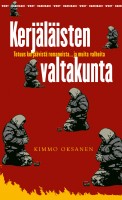 Kimmo Oksanen: Kerjäläisten valtakunta.Totuus kerjäävistä romaneista ja muita valheita
Kimmo Oksanen: Kerjäläisten valtakunta.Totuus kerjäävistä romaneista ja muita valheita
[Kingdom of beggars. The truth about Roma beggars, and other lies]
Helsinki: WSOY, 2009. 214 p.
ISBN 978-951-0-35778-1
€ 15, paperback
After Romania and Bulgaria had joined the European Union in 2007, a small group of Roma beggars from Romania arrived in Helsinki. This was a sight that was familiar to Finns on their travels abroad, but alien to them in the environment of their own city. Begging is not a crime in Finland, but the phenomenon caused a great stir in the media and, eventually, among political decision-makers. This polemic by journalist Kimmo Oksanen gives a face to the beggars and reveals many factors behind begging, as well as experiences of poverty and discrimination. Oksanen observed the beggars on the streets daily and travelled to their home villages to investigate their backgrounds. Roma criminal activity indisputably occurs elsewhere in Europe, but Oksanen maintains that there is no evidence that organised crime has arrived in Finland. The beggars are nevertheless objects of fear as well as racist attitudes.
Love is the only song
7 August 2014 | Fiction, poetry
Poems from Helise, taivas! Valitut runot (‘Ring out, sky! Selected poems’, Siltala, 2014). Introduction by Marja-Leena Mikkola
Who will tell me?
Who will tell me why white butterflies
strew the velvet skin of the night?
Who will tell me?
While people walk, mute and strange
and they have snowy, armoured faces,
such snowy faces!
and the eyes of a stuffed bird.
Who will tell me why in the morning, on the grass,
the thrushes begin their secret game?
Who will tell me?
While black soldiers stand at the gate
in their hands withered roses
such withered roses!
and broken tiger lilies.
Who will tell me, quietly in the sun’s shadow
how to bare my heart?
Who will tell me?
Come to me over the fields
Come close and softly
so softly!
Open the clothes of my heart. More…
Sofi Oksanen wins the 2008 Finlandia Prize
10 February 2009 | In the news

Sofi Oksanen. - Photo: Toni Härkönen/WSOY.
The Finlandia Prize for Fiction, Finland’s most prestigious literary prize, was awarded to Sofi Oksanen’s novel Puhdistus (‘Purge’, WSOY, 2008). ‘When the concentrated focus of drama and the multidimensionality of narrative conjoin, Puhdistus is born – a muscular, harsh, and solid book’, said the writer and critic Pekka Tarkka awarding the prize on 4 December. (For a short review, see the Review section.)
The prize, worth € 30,000, was awarded for the twenty-fifth time. The final choice was made from the shortlist of six candidates; the others were 14 solmua Greenwichiin (‘14 knots to Greenwich’, Otava) by Olli Jalonen, Kosmonautti (‘The cosmonaut’, Tammi) by Katri Lipson, Marie (Otava) by Arne Nevanlinna, Kohtuuttomuus (‘Excess’, Siltala) by Pirkko Saisio and Paholaisen haarukka (‘The Devil’s fork’, WSOY) by Juha Seppälä. More…
Sofi Oksanen: Puhdistus [Purge]
5 February 2009 | Mini reviews
![Sofi Oksanen: Puhdistus Sofi Oksanen: Puhdistus [Purge]](https://booksfromfinland.fi/wp-content/uploads/2009/02/puhdistusweb-130x164.jpg) Puhdistus
Puhdistus
[Purge]
Helsinki: WSOY, 2008. 380 p.
ISBN 978-951-0-33973-2
€ 29.90, paperback
Sofi Oksanen’s first play Puhdistus (‘Purge’) was staged at Finland’s National Theatre in 2007. Oksanen (born 1977) has an Estonian-Finnish background and studied at the Theatre Academy. Puhdistus, her third novel, retells the story of her play about two women and moves through the past by flashbacks between 1939 and 1992. Aliide has experienced the horrors of the Stalin era and the deportation of Estonians to Siberia, but she herself has to cope with the guilt of opportunism and even manslaughter. More…
Nordic prize to Sofi Oksanen
31 March 2010 | In the news
The Nordic Council’s Literary Prize 2010 has been awarded to Sofi Oksanen for her novel Puhdistus (‘Purge’, WSOY, 2008).
The winning novel was selected by a jury from a shortlist of 11 works from the Nordic countries. The prize, worth approximately 47,000 euros, will be awarded in Reykjavik in November.
The novel, about women’s fates in the violent history of 20th-century Estonia, was awarded both the Finlandia Prize for Fiction and the Runeberg Prize in Finland, where it has sold more than 142,000 copies.
So far publication rights have been sold to 27 countries; the English translation, by Lola Rogers, will appear next month in the US, published by Grove Press.
Prix Femina for Sofi Oksanen
5 November 2010 | In the news
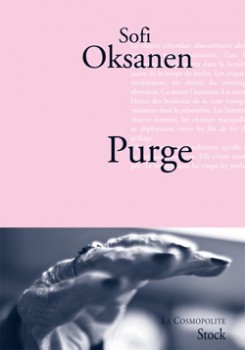 Sofi Oksanen’s novel Puhdistus (English translation, Purge, by Lola Rogers; French translation, also entitled Purge, by Sébastien Cagnoli), was awarded the French literature prize Prix Femina Étranger in early November.
Sofi Oksanen’s novel Puhdistus (English translation, Purge, by Lola Rogers; French translation, also entitled Purge, by Sébastien Cagnoli), was awarded the French literature prize Prix Femina Étranger in early November.
The Prix Femina was founded by the editors of the magazine La Vie heureuse (nowadays Femina) in 1904 as a counterbalance to the Prix Goncourt and the male-dominated award system. The jury members of Prix Femina are women only – whereas the prize can be awarded to either gender.
Among earlier winners of the Prix Femina Étranger – awarded since 1985 for the best foreign novel – are Amos Oz, Joyce Carol Oates and Ian McEwan.
The rights of Oksanen’s novel have so far been sold to 36 countries; Purge has sold approximately half a million copies the world over. In France – where the book also won the Le Prix du Roman Fnac in June – four print runs have sold more than 70,000 copies.
Sofi Oksanen: Kun kyyhkyset katosivat [When the doves disappeared]
9 October 2012 | Mini reviews, Reviews
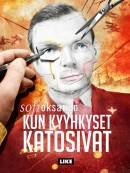 Kun kyyhkyset katosivat
Kun kyyhkyset katosivat
[When the doves disappeared]
Helsinki: Like, 2012. 365 p.
ISBN 978-952-01078-19
€ 27.90, hardback
Four years after the huge national and international success of her third novel Puhdistus (Purge, 2008, now translated into 38 languages), Sofi Oksanen has published a new novel to the accompaniment of trumpets and drums – a launch cruise to Tallinn, Estonia, workshops and public readings. The Finnish film version of Puhdistus received its world premiere at the same time. Oksanen has earned her star status as a writer, but Kun kyyhkyset katosivat is not as good as its predecessor. The story of Estonian freedom fighter (‘Forest Brother’) Roland and his cousin Edgar, an opportunist who manoeuvres his way through the Nazi and Soviet occupations of Estonia from 1941 until the apparent liberalisation of the 1960s, is thin and fragmentary. The language and style are uneven and diffuse, while Edgar’s chameleon-like shifts of identity from pro-German sympathies through Siberia to complicity with the KGB deserve to be more carefully explored. While the book’s themes are unquestionably authentic and relevant, they don’t really blend together into a moving novel in the way that Puhdistus does.
Translated by David McDuff
French prize for Sofi Oksanen
26 August 2010 | In the news
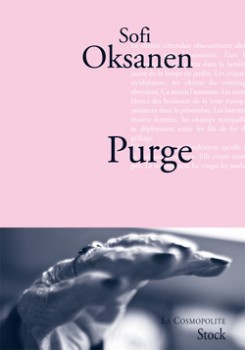 In August the ninth Prix du Roman FNAC was awarded to Sofi Oksanen (born 1977) for her novel Puhdistus (English translation, by Lola Rogers: Purge; see a recent British review [Guardian, August 21] here), to be published in French (by Editions Stock) on August 25 under the title Purge. This is the first time FNAC – the largest bookshop chain in France – has awarded the prize to an author who doesn’t write in French.
In August the ninth Prix du Roman FNAC was awarded to Sofi Oksanen (born 1977) for her novel Puhdistus (English translation, by Lola Rogers: Purge; see a recent British review [Guardian, August 21] here), to be published in French (by Editions Stock) on August 25 under the title Purge. This is the first time FNAC – the largest bookshop chain in France – has awarded the prize to an author who doesn’t write in French.
The jury consists of 900 booksellers and representatives from the general public. They read 300 novels published in France this year, and the winner was chosen out of 30 finalists.
The Finnish production company Solar Films Inc. will transform Puhdistus into a film in 2012: the screenwriter is Marko Leino.
Once more: Sofi Oksanen’s novel wins a prize
10 December 2010 | In the news
Sofi Oksanen (born 1977) has received the Europe Book Prize, worth €10,000, for her novel Puhdistus (Purge, 2008). Chosen from a shortlist of eight works, the prize was awarded by the ex-chairman of the European Union Commission, Jacques Delors, in Brussels on 9 December.
The European Book Prize jury is made up of European journalists and correspondents and was chaired by the German film director Volker Schlöndorff. According to the jury, Puhdistus is ‘a brave and painful exploration into the traumas of the Estonian history’.
The prize was awarded this year for the fourth time. The author expressed her appreciation of the prize by saying Europeanness for her signifies freedom of speech, respect for human rights and the will of sustaining these fragile and easily damaged values.
Human destinies
7 February 2014 | Articles, Non-fiction
To what extent does a ‘historical novel’ have to lean on facts to become best-sellers? Two new novels from 2013 examined
When Helsingin Sanomat, Finland’s largest newspaper, asked its readers and critics in 2013 to list the ten best novels of the 2000s, the result was a surprisingly unanimous victory for the historical novel.
Both groups listed as their top choices – in the very same order – the following books: Sofi Oksanen: Puhdistus (English translation Purge; WSOY, 2008), Ulla-Lena Lundberg: Is (Finnish translation Jää, ‘Ice’, Schildts & Söderströms, 2012) and Kjell Westö: Där vi en gång gått (Finnish translation Missä kuljimme kerran; ‘Where we once walked‘, Söderströms, 2006).
What kind of historical novel wins over a large readership today, and conversely, why don’t all of the many well-received novels set in the past become bestsellers? More…
Success after success
9 March 2012 | This 'n' that
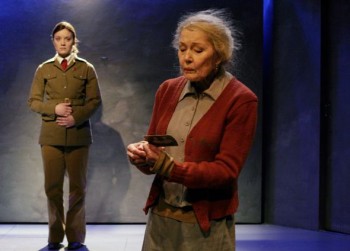
The women of Purge: Elena Leeve and Tea Ista in Sofi Oksanen's Puhdistus at the Finnish National Theatre, directed by Mika Myllyaho. Photo: Leena Klemelä, 2007
Sofi Oksanen’s Purge, an unparalleled Finnish literary sensation, is running in a production by Arcola Theatre in London, from 22 February to 24 March.
First premiered at the Finnish National Theatre in Helsinki in 2007, Puhdistus, to give it its Finnish title, was subsequently reworked by Oksanen (born 1977) into a novel – her third.
Puhdistus retells the story of her play about two Estonian women, moving through the past in flashbacks between 1939 and 1992. Aliide has experienced the horrors of the Stalin era and the deportation of Estonians to Siberia, but has to cope with the guilt of opportunism and even manslaughter. One night in 1992 she finds a young woman in the courtyard of her house; Zara has just escaped from the claws of members of the Russian mafia who held her as a sex slave. (Maya Jaggi reviewed the novel in London’s Guardian newspaper.) More…

